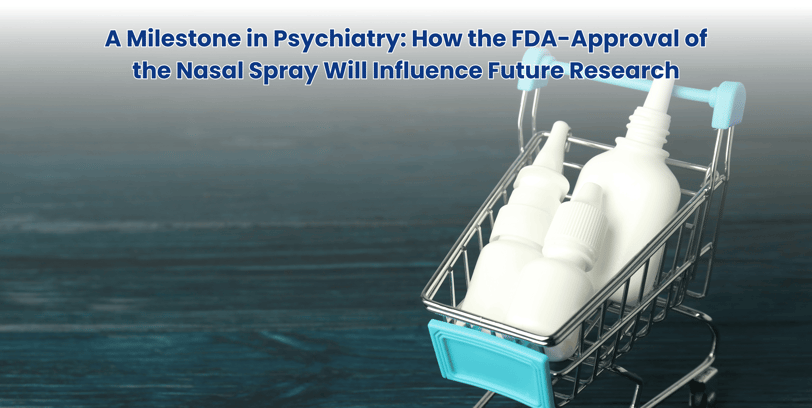A Milestone in Psychiatry: How the FDA-Approval of the Nasal Spray Will Influence Future Research
In recent years, the field of psychiatry has witnessed groundbreaking advancements in treatment options for mental health disorders. Among these, the FDA’s approval of a nasal spray for treatment-resistant depression stands out as a milestone that could reshape the future of psychiatric research and treatment.
1/25/20252 min read


A New Era in Depression Treatment
The nasal spray, marketed as Spravato (esketamine), was developed as a novel approach to address treatment-resistant depression (TRD). Traditional antidepressants, such as selective serotonin reuptake inhibitors (SSRIs), often take weeks to demonstrate effectiveness. For individuals with TRD, these medications may fail to provide any relief. The introduction of esketamine nasal spray changes this narrative, offering a rapid-acting alternative that targets depression symptoms within hours.
Esketamine, derived from ketamine, functions differently from traditional antidepressants. While SSRIs work by increasing serotonin levels in the brain, esketamine targets the glutamate system, a neurotransmitter pathway associated with rapid neural plasticity. This unique mechanism represents a shift in our understanding of how depression can be treated and has inspired researchers to explore new pathways for combating mental health disorders.
Catalyzing Innovation in Psychiatric Research
The approval of esketamine nasal spray serves as a catalyst for innovation in several ways:
1. Exploration of Rapid-Acting Treatments
The success of esketamine has sparked interest in developing other rapid-acting antidepressants. Researchers are now investigating molecules that target the glutamate system, as well as other fast-acting pathways. This shift could lead to a new generation of treatments designed to provide immediate relief for individuals experiencing severe depression or suicidal ideation.
2. Personalized Medicine in Psychiatry
Esketamine’s approval highlights the need for personalized approaches to mental health care. Not every individual responds to traditional antidepressants, and the availability of alternative treatments like esketamine underscores the importance of tailoring therapies to individual needs. Future research may focus on identifying biomarkers that predict a patient’s response to specific treatments, paving the way for precision psychiatry.
3. Renewed Focus on Treatment-Resistant Conditions
Treatment-resistant mental health conditions have historically been challenging to address. The success of esketamine provides hope for patients who have exhausted traditional options. This breakthrough has encouraged pharmaceutical companies and research institutions to prioritize innovative solutions for other treatment-resistant conditions, such as bipolar disorder, PTSD, and anxiety disorders.
4. Breaking Down Stigma in Mental Health Innovation
The approval of a novel treatment like the nasal spray also helps to normalize conversations about mental health and the need for innovative therapies. As the public becomes more aware of the science behind these breakthroughs, stigma surrounding mental health conditions may diminish, encouraging more individuals to seek help.
Challenges Ahead
While the approval of esketamine nasal spray marks significant progress, it also raises important questions and challenges:
Affordability and Access: The high cost of esketamine treatments may limit access for many individuals. Insurance coverage and pricing models must adapt to ensure equitable access to this life-changing treatment.
Long-Term Effects: As esketamine is relatively new, ongoing research is necessary to understand its long-term safety and efficacy.
Potential for Misuse: Given its relation to ketamine, a substance with potential for abuse, strict regulations and monitoring are essential to prevent misuse.
The Road Ahead
The FDA’s approval of the nasal spray is not just a victory for patients with treatment-resistant depression but also a beacon of hope for the broader field of psychiatry. By challenging the status quo and opening doors to innovative treatment modalities, it sets the stage for a future where mental health care is more effective, accessible, and personalized.
As researchers build on the success of esketamine, we can expect a ripple effect that transforms the way we understand and treat mental health disorders. This milestone is just the beginning of a new chapter in psychiatric care—one driven by scientific discovery, compassion, and the determination to improve lives.
